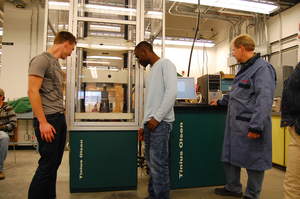HORSHAM, PA--(Marketwire - October 21, 2010) - The two-year diploma program in Civil Engineering Technology (CVT) at SAIT Polytechnic (Calgary, Alberta, Canada) is intensive and rich with opportunities to learn about building materials firsthand. Since the 1970s, the school has made significant investments in lab equipment so students can experiment with, and understand the property differences between the many materials used in construction, especially metals and concrete.
Last fall, SAIT added a brand new 600 kN Super L materials tester from Tinius Olsen so students can perform strength and tensile testing of small steel and cast iron samples. The new machine complements two other Tinius Olsen machines, one a compression machine used for concrete testing and the other a horizontally-oriented torsion tester.
The goal of the lab programs at SAIT is to help students see that every material and sample has its breaking point. Such knowledge is critical in establishing specifications and adhering to them when designing, engineering, and building structures.
"Our students are really amazed by the way that a destructive testing machine can make short work of a steel rod," notes Steve Paul, who heads the CVT laboratory at SAIT's School of Construction. "They watch as metal is stretched until it pulls apart with an audible pop. There is no such thing as indestructible."
The new Super L is equipped with an extensometer and a computer control package so that students can graph and analyze test results and determine the strength of materials they are breaking. "This is a great machine to learn on," adds Wayne Hayward, Tinius Olsen's Marketing Manager. "Our Super Ls are high capacity testers and dramatically underscore that every material, when some degree of force is applied, has a breaking point."
The Strength of Materials course is an especially vital requirement of the Civil Engineering Technology program at SAIT. According to Paul, "There is no margin for error when civil engineers design and build bridges, roadways, and other critical structures. They have to fully understand the limits of materials under all manner of conditions and stress factors, so these many factors are allowed for when building."
SAIT graduates go on to careers as consulting engineers, municipal and city civil engineers, project managers and contractors, as well as residential builders.
SAIT Polytechnic is one of Canada's most exciting destinations for post-secondary education, offering more than 100 career programs that position people for success in technology, trades and business. A leader in innovation, SAIT also collaborates with industry on applied research and delivers corporate training worldwide. SAIT is a member of Polytechnics Canada and one of Alberta's Top 50 Employers for 2010.
Tinius Olsen is a global provider of materials testing solutions (equipment, software, and calibration services) with 125 years of testing experience. It has affiliations with the materials science programs of many leading schools and universities.
For more information, contact: Tinius Olsen, 1065 Easton Road, Horsham, PA 19044 USA, (215) 675-7100, www.tiniusolsen.com or www.schooloftesting.com.
Contact Information:
Media Contacts:
Wayne Hayward
Marketing Manager
Tinius Olsen
(215) 675-7100
